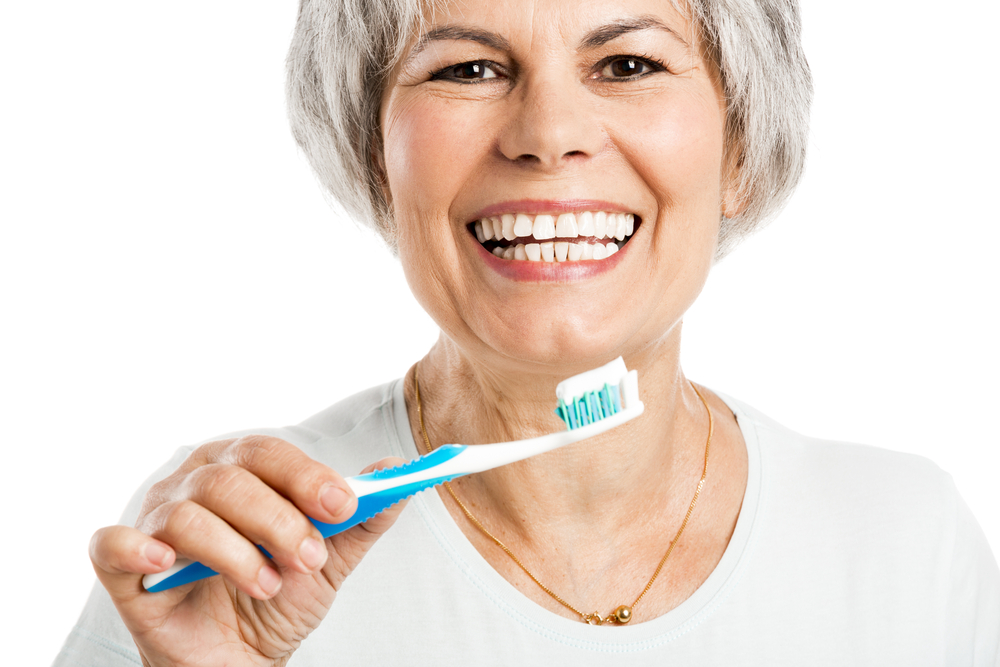
Many of our older patients believe that toothaches, painful bleeding gums, and tooth loss are as inevitable as gray hair and wrinkles. The truth is, dental diseases are not a normal part of aging. Declining oral health is very preventable with these five ways to prevent dental problems as you age.
Maintain or Improve Your Oral Care Regimen
Dental issues are more likely to come up as you age. Missing teeth, receding gums, mouth sores, and jaw pain are just some of the many side effects of growing older. Decay and loss of natural teeth are not inevitable in old age, in any case. Through proper oral hygiene and a healthy diet, elderly patients can continue to maintain good dental health and thereby have a positive effect on the rest of their bodies.
Utilizing the right tools and techniques will help to stop decay and kill the bacteria that lead to gum disease and bad breath. Switching to an electric toothbrush, incorporating a water flosser, and using the right type of toothpaste are all essential components to your oral hygiene routine as you age.
Ensure You’re Producing Enough Saliva
Many medications and illnesses can limit saliva production. Saliva has many natural properties that protect us from disorders, such as severe and rapid tooth decay, yeast infections, and gum disease. More than 400 of the most commonly prescribed drugs for older adults have dry mouth and taste disturbances as a side effect.
If you are currently taking any medications and have begun to notice a lack of saliva production, speak with your doctor. There could be other medication options available to you.
Stay Away From Acid-Producing Foods
Harmful bacteria love to feed on sticky and sugary foods, which produce acid that promotes tooth decay and gum disease. Every time your mouth is exposed to sugar, bacteria begin to produce acids that burn your teeth and gums. Say no to the sweets and stay away from other acid-producing foods.
Eat a Healthy Diet
Every food choice you make has the potential to affect your oral health. Maintaining a healthy diet by incorporating fresh fruits and vegetables will help to keep your teeth and gums in excellent health.
Foods high in omega-3 fatty acids are essential for people of all ages, including older adults, as they help prevent inflammation, which can lead to cancer, rheumatoid, arthritis, and heart disease. Fatty acids have also been shown to reduce the risk of Alzheimer’s disease and keeping the brain alert.
When it comes to eating a balanced diet, your body will thank you for including:
- Carbohydrate-rich foods like sweet potatoes and brown rice
- Protein-packed portions with salmon, lean meats, and legumes
- Five portions of fruits and vegetables per day
- Low-fat dairy
- Consuming healthy fats in the form of nuts, fish, and oils
- Decreasing your sodium intake
Stay Hydrated With Water
Drinking plenty of water helps to keep your body hydrated and flushes out toxins that you otherwise store. Scientists have proven that drinking fluoridated water helps to maintain healthy teeth, and is an important part of maintaining good oral hygiene. In addition to your oral health, as you age, your body’s ability to conserve water decreases. Dehydration leads to drowsiness and confusion, among other side effects, so it’s essential to your overall health to stay hydrated even if you do not feel thirsty.
Make Time For Routine Dental Exams
Oral problems are not inevitable as you age. These 5 ways to prevent dental problems as you age can help you in taking charge of your oral health. Seeing your dentist for routine checkups and cleanings will help to keep your oral health on track. When caught early, common dental conditions in elderly patients can be reversed or relieved with proper treatment. Call Hinsdale Dentistry today to schedule your next professional cleaning and exam.